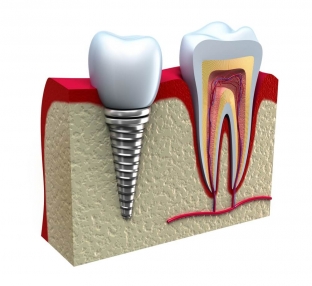Dental implantation is the process of replacing decayed or lost teeth with implants placed in the jaw bone, followed by prosthetics. Thanks to implantation, the usual functions of the jaw system are restored. The success of implantation depends on many factors, including the site of the implant, the available volume and quality of bone tissue, the thoroughness of preliminary planning, the qualifications of the doctor, and the patient's compliance with the care regimen before and after dental implantation.
Preparation: what activities are necessary before dental implantation?
Preparation for tooth implantation – an important stage on which the outcome of the procedure largely depends. Therefore, as a preparation:
- Before dental implantation, the doctor evaluates the condition of the dentoalveolar system using CT, radiography and other research methods.
- An anamnesis and necessary information is being collected about the patient's health status, sensitivity to drugs, exclusion of contraindications, etc.
- Appropriate treatment provided if:
- caries;
- periodontitis;
- periodontitis and periodontal disease.
Orthopedic training is required if there are prosthetics that need to be replaced. An important point is the assessment of the compatibility of materials – the metals used must have similar properties.

A week before implantation, the patient will need to stop taking blood thinners in order to minimize bleeding after surgery.
- The patient receives all the necessary information about oral hygiene in general and the care of implant prostheses in particular.
In addition, in the process of preparing for implantation, the dentist also evaluates:
- the condition of the oral mucosa;
- state of bone tissue;
- anatomical features of the jaws;
- the relative position of the anatomical formations of the dentoalveolar system.
What are the basic rules for oral care after dental implants?
Before or after dental implantation, the doctor is obliged to provide the patient with all the necessary information about the rules for caring for the oral cavity after implant placement. The main tasks of postoperative care are:
- Prevention of infection.
- Speed up the healing process.
Prevention of infection and accelerated healing – main goals of postoperative care.
Therefore, in terms of care after dental implantation, as a rule, the patient should:
- Take medications prescribed by your doctor (antibiotics, anti-inflammatory and/or painkillers);
- apply ice compresses for about a day after the intervention (15 minutes / 15 minutes break);
- avoid physical activity and stress (2 weeks);
- refuse to visit the baths and pools for two weeks;
- eat liquid or soft food, avoid hot and spicy foods;
- use special solutions prescribed by the doctor for rinsing;
- be sure to brush your teeth, taking special care at the site of the operation;
- to give up smoking and alcohol;
- sneeze and blow your nose very carefully;
- cancel flights for a certain period of time;
- until the wound heals, chew on the opposite side.
After dental implantation, the patient should visit the dentist regularly (2 or 3 times a year) for routine check-ups. It is also important to remove plaque in a timely manner, which can initiate inflammatory processes, and to conduct an x-ray examination for possible deformations of the prosthesis and bone.
Thus, the activities before dental implantation and careful adherence to the regimen of care for implants and the oral cavity after the operation – important components of a successful outcome of the intervention and a long service life of the implant.






Add a comment